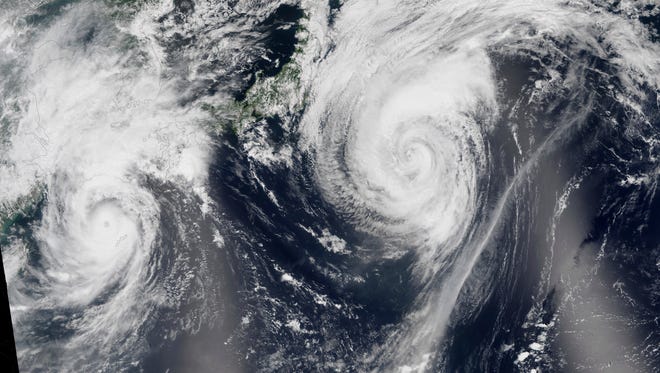No time to waste as islands disappear: Column
Climate change is disrupting industries and ecosystems. With or without the U.S., we need action.

For most Americans, it's easy to wave off climate change as a distant threat, one that poses more danger to future generations than to the Earth's current inhabitants.
I don't have that luxury. Rising sea levels fueled by climate change threaten the very existence of my country, the Caribbean nation of Grenada. And I'm not alone. Millions of other residents of small island states worldwide are in a similar predicament.
We carried that message to the global community at the United Nations Climate Conference in Marrakech, Morocco, last month. Known as "COP22," the event marked an important milestone toward the implementation of the historic Paris Agreement forged at COP21 last year.
As encouraging as the Paris Agreement is, we cannot afford to be complacent about climate change. The global community — and the developed world in particular — must work toward even more ambitious goals for curbing carbon emissions and financing climate-change mitigation efforts in small island states like mine.
There's no time to waste. Earlier this year, one study concluded that five islands in the Solomon Islands archipelago have vanished due to rising sea levels since 1947. The shorelines of another six have severely eroded. In some cases, entire villages have been destroyed.
By one estimate, a sea-level increase of only 80 centimeters would cover more than half of the Marshall Islands, in the South Pacific. A 90-centimeter rise would submerge most of Male, the capital of the Maldives, in the Indian Ocean.
The effects of climate change are already disrupting major industries in island nations. Several Thai islands suspended tourism indefinitely earlier this year due to coral bleaching induced by climate change. The trend is expected to cost Grenada's tourism sector as much as $25 million annually by 2050.
Climate change, the missing issue: Our view
Also as a result of climate change, extreme weather has become a more common feature of small-island life. Two category 5 cyclones hit the Polynesian archipelago of Tonga between 2014 and 2015. In the past, such storms occurred once every five to ten years.
The very survival of many small island states depends on rapid, multinational action. The Paris Agreement is a valuable first step. It includes a plan for keeping global temperatures from rising more than 1.5-2 degrees Celsius above pre-industrial temperatures. But now countries must deliver on their promises. They can start by re-examining the emissions reduction commitments they have made.
According to the United Nations, those contributions aren't enough to keep global temperature increases below 1.5 to 2 degrees Celsius — at least not if countries have until 2025 or 2030 to reach their initial emissions goals, as they currently do. When they next meet to take stock of their efforts, in 2018, participating nations should commit to make their initial contributions to emissions reduction stronger, and to meet these targets no later than 2025. Developed countries must also make good on their commitment to provide $100 billion annually by 2020 to help the developing world adjust to the effects of climate change.
Warming is mild and manageable: Opposing view
POLICING THE USA: A look at race, justice, media
Some in the United States and across the world are skeptical that an international effort like this one will be possible with Donald Trump in the White House. Such doubts are premature and counterproductive.
To be sure, the president-elect has signaled that he may withdraw the United States from the Paris Agreement. But whether he will follow through remains to be seen. After all, a strong majority of Americans — including 57% of Republicans — support the pact. Trump also prides himself on being a strong leader. The climate crisis offers an opportunity for the United States to provide that leadership. .
Further, his nomination of ExxonMobil CEO Rex Tillerson as secretary of State may actually bode well for action on the climate. Under Tillerson, ExxonMobil endorsed the Paris Agreement, supported a carbon tax and began assigning a cost to carbon emissions in its internal accounting.
And then there's the president-elect's daughter Ivanka, who reportedly wants to make climate change one of her signature issues.
But with or without the United States, aggressive international action is needed right away. For island nations, climate change isn't just a long-term challenge; it's an immediate existential threat.
Hugh Sealy is a professor in the Department of Public Health and Preventive Medicine at St. George's University in Grenada. He was a lead negotiator for small island states at the COP22 Summit in Morocco.
You can read diverse opinions from our Board of Contributors and other writers on the Opinion front page, on Twitter @USATOpinion and in our daily Opinion newsletter. To submit a letter, comment or column, check our submission guidelines.